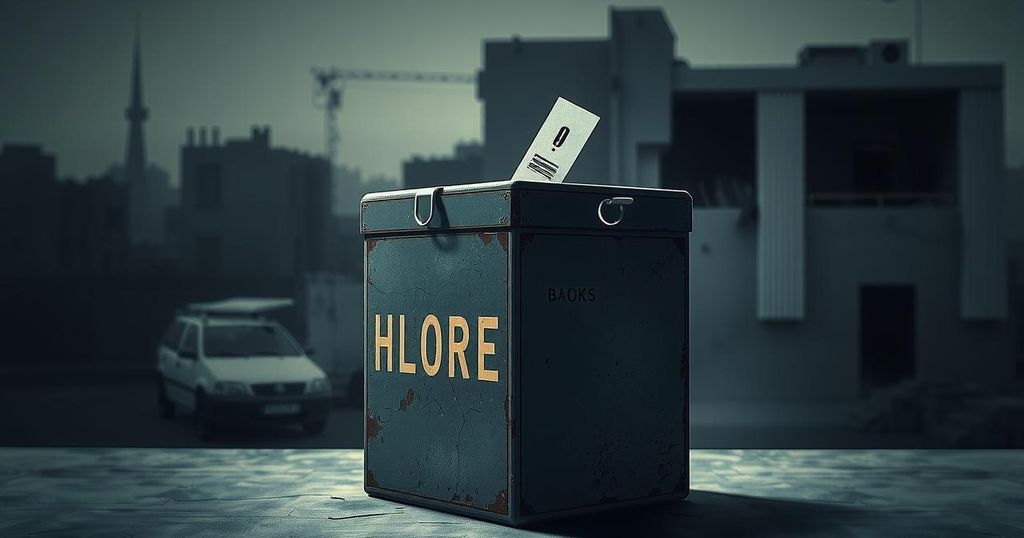President Daniel Noboa leads the early counts in Ecuador’s presidential election, yet faces a challenge to secure enough votes to avoid a runoff. The elections are marked by concerns over rampant violence and economic distress. If no candidate achieves the required vote percentage, a second round is slated for April 13, as the nation strives to overcome its severe security challenges.
Incumbent President Daniel Noboa exhibited a robust lead during the early counts of Ecuador’s presidential election held on Sunday, yet it remains uncertain if he will achieve the requisite majority to evade a second-round runoff. Preliminary results indicated Noboa securing 46 percent of the votes, while leftist contender Luisa Gonzalez managed 42 percent. With only about two million votes counted thus far, the populace anticipates the complete results in the hours to follow.
Approximately 13 to 14 million voters were expected to participate in selecting a new leader for a nation grappling with unprecedented violence, representing its gravest crisis in 50 years. Economic stagnation and cartel conflicts, which have drastically transformed Ecuador from a safe environment into a perilous one, have dominated campaign discussions. Voter Luis Jaime Torres expressed urgency for changes, stating, “The only thing I ask the new president is that they fix this mess.”
Due to threats surrounding the elections, heavily armed troops were stationed at polling stations nationwide as emergency services reported serious warnings of potential attacks against democracy. The initial infractions reported were minor, focusing mainly on about 20 individuals accused of infringing a three-day alcohol prohibition. Recent elections have faced extreme risks: during the last campaign, a prominent candidate was assassinated.
Candidate Gonzalez revealed her fears about security, remarking, “There are intelligence reports that say there are risks and that they want to take my life, but there is a bigger challenge here. There is a challenge to transform the country.” To clinch victory, Gonzalez will require a significant surge in votes ahead of Noboa, the scion of a banana plantation magnate.
If no candidate secures at least 50 percent of the votes or 40 percent with a 10-point lead over the nearest rival, another election will take place on April 13. At the age of 37, Noboa stands as one of the world’s youngest leaders, relying on a vigorous social media presence and a stringent crime-fighting agenda to bolster his electoral prospects.
The influx of drug trafficking through Ecuador has led to spiraling violence, as cartels exploit the country’s ports to reach booming markets in Europe and Asia. This rampant crime has caused unprecedented rates of murder and extortion, prompting President Noboa to declare a state of emergency and deploy military forces throughout the country to restore order before the elections.
Amid fears of violence, borders with Colombia and Peru have been temporarily closed during the election period, with military personnel assisting with the distribution of ballots. Concerns about potential military abuses have arisen due to the strong military presence. Political analyst Leonardo Laso remarked, “Ecuador is in a very difficult moment, I think in the worst crisis since we returned to democracy.”
The economic impact of insecurity has deterred tourists and investors, as unemployment rises and a recession looms. With the International Monetary Fund involved to assist in addressing a looming fiscal deficit, Ecuador is also preparing for a potentially significant influx of returning migrants. Merchant Vinicio Colcha characterized the current atmosphere as a “dark outlook,” reflecting widespread concern for Ecuador’s future.
Ecuador is confronting an alarming increase in violence and criminal activity, fueled by drug trafficking, which has substantially altered its security landscape. The nation now faces its worst crisis in decades, with heavy implications for its economy and societal stability. Recent elections are occurring under the shadow of considerable threats, emphasizing the challenges facing not only candidates but also the electorate as a whole.
The recent voting in Ecuador reflects the deepening crises facing the nation, influenced by violence, economic struggles, and a significant drug trade. President Noboa’s lead in the early counts raises questions about his ability to secure a definitive victory amidst these conditions, with a potential second-round runoff looming. As Ecuador grapples with these multifaceted challenges, the outcome of the election could be pivotal for its future stability and governance.
Original Source: www.leaderherald.com






